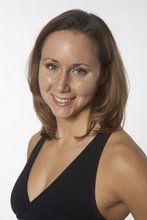
In the last few days, I've had several phone consults with new clients. When I first start with a client, I usually try to connect via voice rather than just email so that they can completely communicate their wants, needs, experiences and goals. I feel that this is lost in the email process.
Through these conversations, I've been exposed to some common beliefs and trends among women with respect to eating and exercising for their ideal body composition (not a competiton body though, as that doesn't exist in real life anyhow unless that's all you dedicate your life to; and, if you have a family or a full-time job, that's mostly not the case). So, rather than go into excessive detail about these ideas, I'm going to list a few of them in bullet-point like my good friend Tony Gentilcore does in his blogs for the Boston Herald. Mine may not be as facetious, but I'll do my best to be somewhat as entertaining:
(Oh, and I threw in a random wedding pic because... well... I can)
1) To get the body I want, I can never eat bread again.
True and False.
Yes, white flour products are pretty much useless foods and don't need to be eaten by anyone. But, if you're really a bread-lover and you enjoy your toast in the mornings, why not reach for bread made without flour? If you've never heard of sprouted grain breads, you have to give them a try. They're much tastier than white flour or whole grain flour, and contain more protein, more vitamins and more fiber than any flour-based bread you'll find on the market.
To make these breads, the whole grains are soaked until the turn into a paste-like consistency. They then are risen and baked just like bread. The result is the whole grain without any fake vitamins or minerals to make them nutritious again.
My favorite ones are Food for Life's Ezekial 4:9 bread in Sesame and Cinnamon Raisin flavors. They're just amazing!
You'll find these products in the freezer section of the bread aisle or in the Natural Health Food section. They have to be kept frozen or refrigerated because they lack the preservatives that other breads contain. Check them out today! Whole grains are good for you and can be part of an ideal body composition diet.
2) Is it really important to eat vegetables to lose weight? What should I eat?
Yes! Most definitely.
Vegetables are low-calorie foods that can be used to fill you up during/after a meal without putting you over the caloric edge. They also are necessary for balancing out the acid-base balance in your body, which is important both for ideal health and maintenance of lean muscle tissue.
It may seem like a dauting task to eat vegetables, but they are many ways to get them into your normal eating routine:
a) Add low-calorie vegetables like cucumbers, tomatoes, mushrooms, celery, greens, peppers, and squash to any meal or snack. Even baby carrots with hummus can be a great treat.
b) Make one of your meals a salad, with proteins and a variety of vegetables of choice (don't forget to add heart-healthy olive oil dressing).
c) Create your own soups or stews with baby red potatoes or yams, carrots, celery, parsley, and onions.
d) When eating out, substitute pasta with steamed vegetables and/or a salad.
e) Drink vegetable juice like V8 or other similar products with any meal or as part of your daily snacks in conjuction with a protein source. If you prefer low-sodium products, those are available too.
f) Remember that frozen vegetables are still vegetables and can be used to help you create a quick stir-fry or add more veggies to any meal you're eating (my favorite is green peas...).
g) Make your morning eggs with spinach, cilantro and parsley. Yum!
Those are just a few ideas. Work with what you have available to you in your area and try to by local produce as much as possible. For example, in my area, squash, tomatoes, corn and cucumbers are being sold at road-side farm stands. I pick some new ones up each day and cook/eat them with every meal.
3) To lose weight, I have to eat protein with every feeding/meal.
Yes and no.
When women think protein, they often think of protein-dominant foods like chicken, fish, egg whites, and whey (or soy). Then, to incorporate that with their morning or mid-day snack seems like an undesirable task. I mean, do you really want to eat chicken 24/7?
Eating protein-containing foods is important because it helps to increase the amount of energy expended during eating (called the thermic effect of food), and promotes more satiety than eating meals or snacks without.
Thus, I do agree that it is very useful to eat a complete protein sources (originating from animal products) at your main three meals: Breakfast, Lunch and Dinner. But, when you eat meals between these three (i.e. snacks), you don't necessarily have to eat a high-protein containing pure animal-based protein source. Foods like beans (hummus, dips, whole beans, etc), yogurt, cheese and nuts can be a great choice between breakfast and lunch or lunch and dinner. They do supply your body with some of the same components as high-protein animal proteins (amino acids), and they also add things like fiber and good fats that you don't get otherwise.
So, don't lose your mind that you're not eating fish at your morning snack. You can enjoy yogurt with almonds, or red-bell peppers with olive-oil based hummus and still fill statisfied while reaching a healthy and lean body composition.
I'll continue later this week with more tips and ideas. In the meantime, if you have any thoughts or ideas in this area, I'd love to read about them.
Enjoy your holiday weekend!
ROTATING_4+copy.gif)




4 comments:
Nothing workout/fitness related, just wanted to say you look beautiful in your wedding pictures! Congrats!
Nice post. Thanks for the tips. It is important to know which food we should eat.
Nice post, we need to have a balance nutrition.
Hi.. Interesting article.
I am a bread lover, I think sprouted grain breads is a good choice if you want to make a change in your diet.
Post a Comment